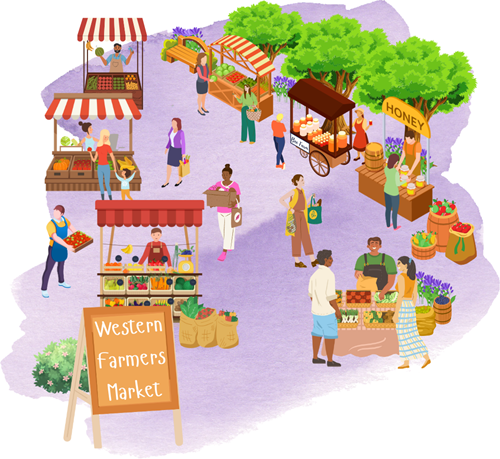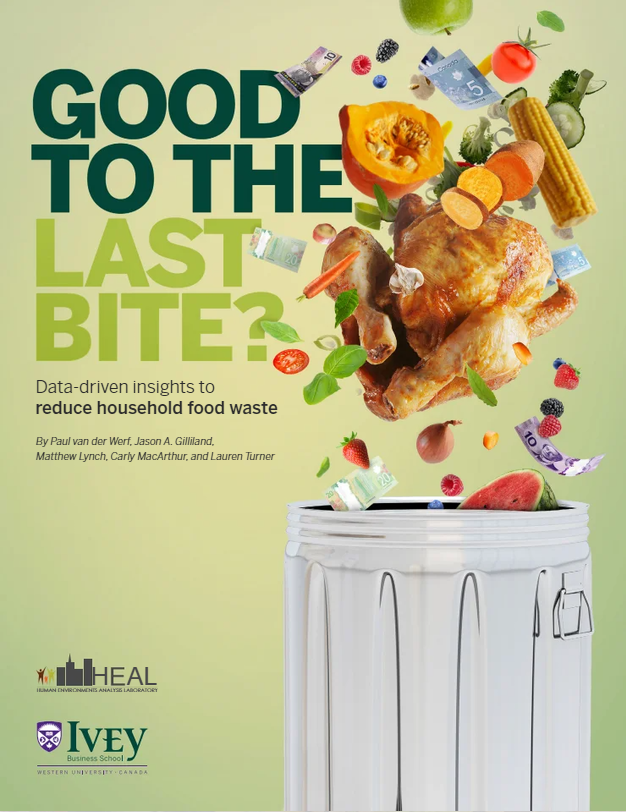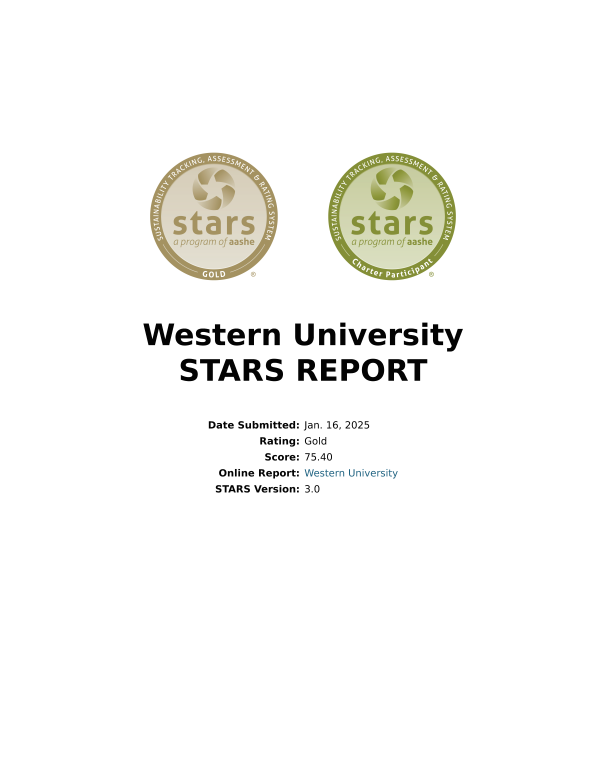SDG 2 - Strategic Initiatives
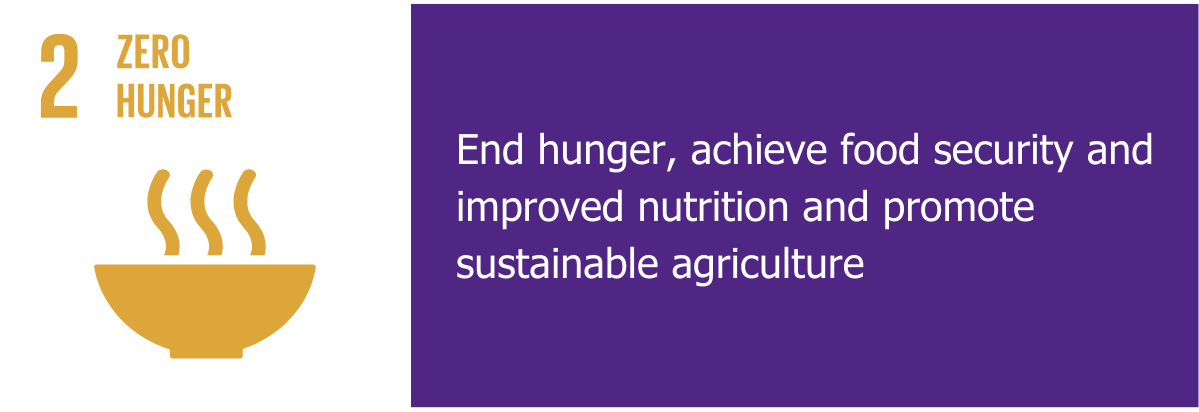
Sustainable Agriculture 
Western provides access to sustainable agriculture, aquaculture, and food security knowledge to local and national farmers and food producers, both free and paid.
Abell-Hodgson Chair in Regenerative Agriculture: Ivey Business School has established a Chair that supports interdisciplinary research and grassroots collaboration to develop inclusive, climate-smart farming systems. This initiative empowers farmers through peer-to-peer learning, resource sharing, and systems-level innovation to build a more sustainable and equitable agri-food future.
Agri-Food System: The Centre for Building Sustainable Value at Ivey Business School has identified Canada’s agri-food system as a target for shaping systems change towards an ecologically sound and fair future. They focus on engaging and mobilizing changemakers within the system, including researchers, farmers, and policymakers. Some initiatives include:
- Entrepreneurship and Sustainability Accelerator (“Regenerator”) Initiative: In collaboration with the Morrissette Institute for Entrepreneurship, this program compresses years of knowledge and learning into four months to promote a just transition to net-zero and a circular economy.
- Systems Transformation Pathway Initiative: This project engages farmers, processors, retailers, agri-tech entrepreneurs, investors, and policymakers to identify a nature-positive, net-zero, circular, diversified, and equitable shared vision for the Canadian Agri-food system.
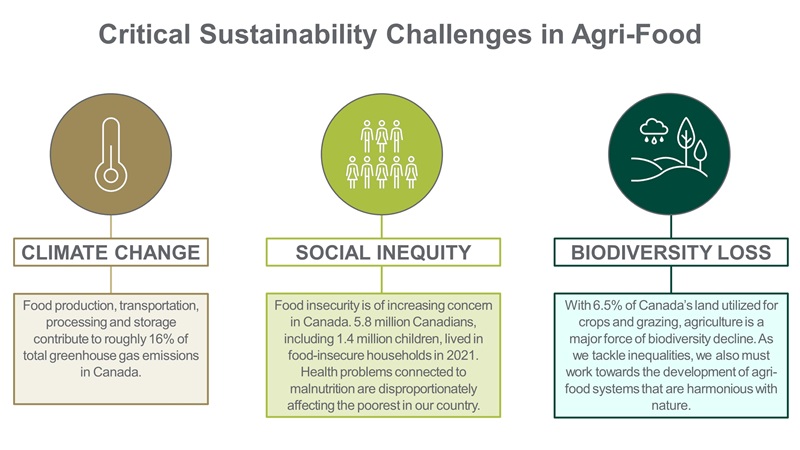
Agrivoltaic Agrotunnel: This innovation combines photovoltaics with indoor and outdoor farming to provide locally grown food all year round. It offers reliable year-round food security. By managing costs within a controlled environment, it ensures stable crop prices regardless of the season, offering potential savings to consumers. The team is actively pursuing partnerships to introduce these structures into new farming communities in Canada.
AI Farming Models: Western researchers have developed an open-source machine learning system that uses AI and computer vision to detect strawberry ripeness and disease with nearly 99% accuracy. This low-cost, high-precision tool empowers farmers to reduce food waste, optimize harvest timing, and enhance crop quality, supporting more sustainable and resilient food systems.
Biotron Experimental Climate Change Research Centre: Through a globally funded project, Dr. Karas is designing synthetic chloroplast genomes to enhance crop traits like nutrition, resilience, and climate adaptability, the research aims to unlock transformative solutions for global food security.
Free and Open-Source Hardware: Western Engineering’s Free Appropriate Sustainability Technology (FAST) Research Group facilitates the creation of open-source physical technologies to advance sustainability. FAST is advancing sustainable agriculture by developing solar-powered, self-replicating 3D printers and innovative recycling technologies. By enabling decentralized production of agricultural tools and equipment, guided by open-source designs and enhanced by artificial intelligence, the group is improving efficiency, reducing costs, and increasing accessibility for Canadian farmers.
Nutrient Movement and Modelling Lab: Advances food security and sustainable agriculture by researching how soil organisms and nutrient cycles impact crop productivity and environmental health. Through open-source modelling tools, field-based research, and collaboration with local producers, the lab equips farmers with science-based strategies to enhance soil health and reduce environmental impact.
Planting Seeds for Urban Indigenous Food Sovereignty: In partnership with the Southwest Ontario Aboriginal Health Access Centre, this project empowers local Indigenous communities by restoring access to traditional foods and cultural food practices. Through land-based learning, cooking demonstrations, and community-led programming, the initiative supports long-term food sovereignty while reconnecting urban Indigenous people with their ancestral knowledge, health, and identity.
Regenerative Agriculture: This project aims to inform agricultural practices across Canada, involving representatives from farming, municipal government, food processing, food science, civil society, and financial services. Regenerative agriculture refers to farming principles and practices that enhance the entire ecosystem rather than a linear supply chain approach to land management.
“Solar Burgers”: The integration of solar panels with agriculture—is revolutionizing food production by allowing crops and livestock to thrive under solar infrastructure. This dual-use approach boosts land efficiency, reduces water use, and generates clean energy, offering a sustainable model for farming in a changing climate.
System Transformation Pathways Initiative: Ivey Business School brings together stakeholders across Canada’s agri-food system to co-create a shared vision for a sustainable, net-zero, and equitable future. By identifying key barriers and mapping actionable pathways—such as new technologies, financial models, and sourcing strategies—the initiative empowers farmers, entrepreneurs, and policymakers to accelerate systemic change in food production and distribution.
Towards Equitable Sustainability Transitions Lab: The primary goal of the lab is to support community partners grappling with social complexities and pursuing sustainable futures. Publications such as Envisioning Prairie Agroecology: Farmer visual constructions of place-based ecological agriculture futures in Canada and Responsibility and Food Sovereignty in an Urbanizing and Risky World are available to farmers online.
100% Great Lake Fish Ontario Supply Chain Analysis: Ivey has openly published a book on supply chain dynamics of fish harvesting and processing across the Great Lakes region. This document helps local farmers engaged in aquaculture to improve their practices and contribute to a more sustainable and secure food system.
Agricultural Events 
Ivey Business School provides many free events for local farmers and food producers to connect and transfer knowledge.
Collective Action Program: The interdisciplinary Ivey project team established a regional, inclusive community of practice that catalyzes regenerative agriculture at the county level through a series of curated workshops and social gatherings; these events led by expert facilitators from the agricultural community, will take participants through an iterative pathway development process including understanding the history and current state of agriculture within Middlesex county , co-developing shared visions, and ideating on solutions.
Future of Agri-Food Event Series:  This free series convenes Canadian thought leaders to explore the future of the Canadian Agri-food sector, covering key opportunities and challenges associated with a just climate transition. This free series is aimed at farmers, processors, retailers, agri-tech entrepreneurs, investors, and policymakers. It includes:
This free series convenes Canadian thought leaders to explore the future of the Canadian Agri-food sector, covering key opportunities and challenges associated with a just climate transition. This free series is aimed at farmers, processors, retailers, agri-tech entrepreneurs, investors, and policymakers. It includes:
- Challenging the Agri-Food Paradigm: Voices of the Farmer: Hear from three Canadian farmers about their decision to change practices, the challenges and opportunities they encountered, and key enablers for other producers to follow this path.
- Circular Food Economy: Canada’s $50 Billion Opportunity: Panelists explore emerging innovations for reducing, and ultimately eliminating, food waste and examine opportunities to scale practices that support the circular economy through finance and policy.
- Future of Agri-food: Canada’s Leadership Opportunity: Explore the large-scale opportunity for Canada to be a leader in agri-food, examining facets such as sustainability, technological innovation, and global market competition.
- Ivey Sustainability Conference: Ivey aims to create an inclusive community of scholars eager to push the frontiers of knowledge towards sustainable development. One keynote speaker, shakara tyler, discusses food justice, food sovereignty, and environmental justice, providing technical assistance to underserved farming groups such as Black, Indigenous, People of Colour, women, and beginning farmers.
- Regenerative Agriculture: The Role of Finance & the Value Chain: Explore the role that regenerative agriculture can play in the transition to a more sustainable food system, and how the food industry and the financial sector can incentivize and scale sustainable practices by producers.
- Sustainability, Food and AI Conference: ICFAR hosts this conference on technology and process solutions that can advance sustainable agri-food systems. The focus will be on combining solar energy production, food, and computing. Academics and business leaders will sync knowledge on issues, challenges, trends, and opportunities to create a sustainable food system.
Western Accelerator – Regenerator Stream: Focused on ventures dedicated to agri-food startups that exemplify the World Economic Forum’s call to “regenerate the future.” Ventures accepted into the program will receive hands-on mentorship and educational training from in-house experts and industrial partners.
Access to Farmers 
Western provides local farmers and food producers free and paid access to university research to improve sustainable farming practices.
- Advancing Regenerative Agriculture in Canada:
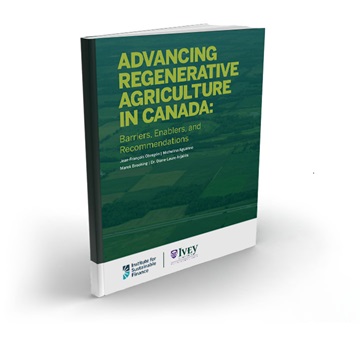 This free public report provides a systemic overview of the state and potential future of regenerative agriculture in Canada, providing a systems shift to improve the industry’s long-term sustainability.
This free public report provides a systemic overview of the state and potential future of regenerative agriculture in Canada, providing a systems shift to improve the industry’s long-term sustainability. - Agrivoltaics: Western researchers are exploring this open-source technology to enhance sustainable farming by providing farmers with access to solar technology research.
- Environmental Sciences Western Field Station: Supports sustainable agriculture through collaborative research with partners like Agriculture and Agri-Food Canada. The 33-hectare site includes intensively managed research plots, crop rotations, and ecological study areas, enabling field trials and the production of feedstocks for on-campus experiments. Equipped with farm-scale tools and infrastructure, the station fosters innovation in crop science, agroecology, and food systems resilience.
- Molecular Genetics Unit: Offers advanced facilities for plant and animal molecular biology research. Local farmers can access resources such as DNA sequencing and genetic analysis tools, to study crop genetics and develop sustainable farming innovations. This access supports collaboration between researchers and producers to improve agricultural practices.
- Net Zero Energy Farm: This collaboration with Food Security Structures Canada involves developing a net-zero energy farm that produces berries year-round. The initiative provides local farmers with access to advanced growing systems and photovoltaic technology to enhance food security and sustainability.
- Open-Source Photovoltaics: Solar energy technology is being used to optimize the production of food in a modular, scalable production system. Collaboration between farmers, engineers, and AI specialists aim to transform their concepts into tangible—and tasty—solutions.
- Sustainable Agri-food Futures: This partnership with the University of Guelph focuses on soil health, bringing together farmers, industry partners, and academics to address farming challenges through innovation. The project proposals involve field-testing the research on farms in collaboration with local farmers.
- Western Farmers Market: Primarily serving the Western community, this market supports local farmers by providing a free venue to sell their produce.
- Western Innovation for Renewable Energy Deployment: Provides open access to agrivoltaic research infrastructure, enabling local farmers and food producers to explore sustainable farming innovations. By integrating solar energy systems with agriculture, WIRED supports hands-on experimentation and data sharing to improve crop yields, reduce emissions, and enhance farm resilience.
- Western Nanofabrication Facility: An open-access facility that supports farmers in optimizing pesticide and fertilizer use, and in developing crops with greater resistance to pests and environmental stresses.
- Western Research Parks: These facilities offer state-of-the-art labs, equipment, and tech to support innovation and commercialization efforts, providing farmers and other industry members access to cutting-edge research and technology.
Hospitality Products and Services 
Hospitality Services is dedicated to reducing our environmental footprint by prioritizing the purchase of locally sourced and sustainable products and services. Learn more in the Hospitality Services Sustainability Commitment Report.
- Buying Local: How do we define local? Anything produced, raised, or processed in Ontario!
- Fair Trade: Hospitality Services went Fair Trade in 2015! We offer coffee, tea, and chocolate bars.
- Food at Western: Everything food at Western: from healthy eating to campus meal plans to food support programs and helpful apps, your food questions are answered here.
- Honeybees: Great Hall Catering maintains honeybee hives on campus, from which honey is used in various recipes, made available for tea and coffee, and also bottled for sale.
- MealCare: Western partners with the NGO MealCare to rescue surplus food and redistribute it to feed those in need in our community.
- Meatless and Vegan: Residence dining serves 48% of their menu options as meatless, and half are completely vegan.
- Nutrislice: An interactive portal allows students to explore the emissions grade of their meal choices.
- Nutrition Support: A registered dietician is available to support food allergies, religious needs, and specific dietary requirements.
- Operational Efficiency: Rational Combi ovens reduce energy consumption by over 28%, and Turbo Chef ovens operate at energy costs as low as $2.08 to $5.66 per day. Energy Star rated dishwashers reduce water usage to just 0.48 gallons per rack during the final rinse.
- Sustainable Seafood: Hospitality Services has committed to sourcing seafood from Marine Stewardship Council (MSC), Ocean Wise, and Best Aquaculture Practices certified suppliers.
Hospitality Services has future commitments to expand fair-trade product selection, advance sustainable seafood sourcing, continue retrofitting cooking equipment, electrify delivery vehicles, and transition to self-sustainable production. For general inquiries on Hospitality Services Sustainability, please email hs-sustainability@uwo.ca.
Food Waste Tracking
Western University is focusing on improving waste reduction and diversion. We measure and track our campus waste, which includes food waste. We consistently make infrastructure updates and work with vendors to identify waste sources for more efficient management. Western Sustainability posts historical waste diversion rates on their website. We also track and report waste through AASHE STARS. Our organic waste is transported to a waste management facility just outside of London where multiple techniques are used when converting organic material into renewable natural gas (RNG) as well as fertilizers and compost that is re-used in the agricultural sector.
Further efforts include:
- Hospitality Services: Our commitment to reducing waste and supporting a circular economy is reflected in a range of initiatives aimed at minimizing landfill impact, diverting waste streams, and supporting local communities. The Choose2Reuse Ecotainer program reduces plastic waste.
- Second Harvest and MealCare: Salvageable food from residence dining and campus eateries is recovered and redistributed to organizations feeding those in need in the London community. From May to October 2024, Western donated over 8,000 meals to 20 non-profit agencies and saved more than 15 tonnes of greenhouse gas emissions.
- Western Researchers Dig into Food Waste: The Ivey Centre for Building Sustainable Value and Western’s Human Environments Analysis Laboratory research the environmental impact of food waste. Their report, Good to the Last Bite? offers actionable insights to help reduce food-wasting behaviour.
Sustainable Food Choices
Western University is committed to providing sustainable, healthy, and affordable food choices for everyone on campus at all food outlets, including vegetarian and vegan options.
Hospitality Services Sustainability Report 2024
Hospitality Services
- Sustainable Sourcing: Western emphasizes responsible sourcing, with 38% of food and beverage purchases identified as plant-based or sustainably/ethically sourced.
- Vegetarian and Vegan Options: The university offers a significant number of meatless and vegan entrees. Approximately half of the entrees served in residence dining are meatless, and half of those are completely vegan.
- Local and Fair-Trade Products: Western supports local farmers and the economy by sourcing over 30% of its food locally. Western has been a Fair-Trade campus since 2016.
- Sustainability Goals: Hospitality Services works with the Office of Sustainability to identify successes and areas for improvement. They are dedicated to responsible sourcing, sustainable dining, education, and waste reduction.
Visit food.uwo.ca to learn more about everything food at Western.
Value Picks Program
Hospitality Services developed Value Picks: affordable and nutritious meal options under $10 are labelled on menu boards at all food outlets. Our registered dietitian has classified our Value Picks into three categories, based on the value of select macro- and micro-nutrients important for overall health.
Dietary Accommodations
- Benji Impact: The Western chapter of this organization raises awareness of allergies and anaphylaxis, aiming to create a world in which everyone feels safe to eat anywhere.
- Dietary Icons: Menu items tagged with one of the dietary icons indicate that the menu item aligns with that dietary pattern. This includes halal, vegan, vegetarian, and made without gluten.
- Food Allergy: The hospitality team undergoes annual allergen training. Menu items identify the priority allergens outlined by Health Canada.
- Registered Dietitian: Western employs a registered dietitian who helps students use nutrition to support a healthy lifestyle, including finding food options that fit their dietary needs.
Nutrislice
Saugeen-Maitland residence is part of a pilot program in collaboration with Nutrislice. All menu options are listed on a website that includes dietary icons. Each meal is also given an emissions grade, allowing students to make informed choices about the sustainability of their food consumption.
Food Insecurity
Western addresses food insecurities for staff through the following interventions:
- Everything Food at Western: Hospitality Services takes pride in crafting high-quality meals and continuously improving their food system through sustainable sourcing and consumption. Find everything food related here, including food support.
- Food Banks and Meal Programs: These services within the city of London are available to students and staff struggling with food insecurity.
- Ivey Cup Food Drive: Ivey Business students made a record donation to London Food Bank, donating more than 40,000 non-perishable food items.
- Living Wage: All of Western’s employees receive remuneration equivalent to at least a living wage. This enables staff to meet their basic needs, including food.
- MealCare: Western has partnered with MealCare to divert unused food to feed people in need in London, Ontario. Staff in need can make use of this.
- United Way Campaign: The Western contribution to the United Way Campaign is the largest in the region. United Way is a non-profit that partners with local agencies to provide food assistance and address the root causes of food insecurity.
- Value Picks: Nutritious and affordable meals are identified at every food retailer and help students and staff to make healthy, affordable food choices.
- Western Community Garden: This garden is primarily used to grow food crops. Garden plots are available on a first-come, first-served basis.
